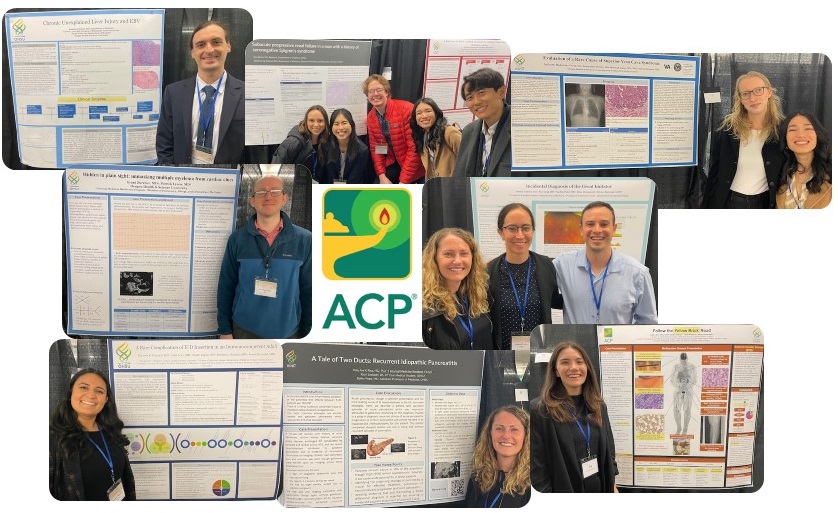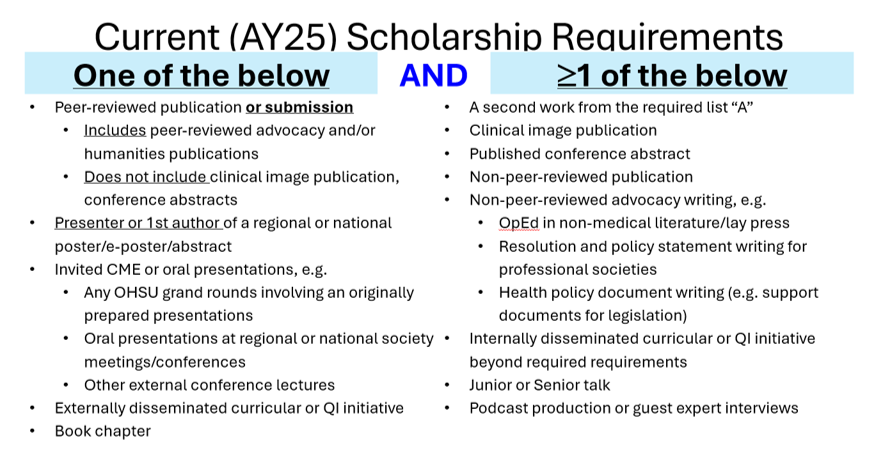Scholarship

Scholarship in residency
The Department of Medicine and the Internal Medicine Residency Program are deeply committed to encouraging and supporting resident research and scholarship in all its forms. This section of our program website aims to highlight past and ongoing scholarship as well as provide numerous resources to guide and assist residents in their scholarly endeavours.
The benefits of scholarship during internal medicine residency training are multiple: career interest exploration, professional development, creative outlets, and mentorship relationships. Scholarship may take many forms, including clinical/translational research, journal review articles or book chapter publications, case reports and clinical images, quality improvement projects, digital scholarship, advocacy-related scholarship, and presentation of abstract or oral presentations at local, regional, or national conferences and society meetings.
Find out more:
Scholarship requirements
Residents are required to complete at least two scholarly endeavors during their three years of residency training. One project must be from the "required" section, and the second project may be from the “required” or “additional options” lists.

Additional information can be viewed here: Scholarship Requirement FAQs.
Quick Links
(A) Required (at least one of the following):
- Peer-reviewed publication or submission
- Does not include clinical image publication
- Does not include published conference abstracts
- Includes peer-reviewed advocacy and humanities publications
- Presenter or 1st author of a regional or national poster/e-poster/abstract
- Invited CME or oral presentations, including:
- Any OHSU grand rounds involving originally prepared presentations
- Oral presentations of at regional or national society meetings/conferences
- Other external conference lectures
- Externally disseminated curricular or QI initiative
- Book chapter
(B) Additional Options
- A second work from the required list “A”
- Clinical image publication
- Published conference abstract
- Non-peer-reviewed publication
- Non-peer-reviewed advocacy writing, including:
- OpEd in non-medical literature/lay press
- Resolution and policy statement writing for professional societies
- Health policy document writing (ex. support documents for legislation or “take away”s for advocacy with legislatures)
- Internally disseminated curricular or QI initiative beyond anything required for residency program rotations
- Junior or Senior talk
- Podcast production or guest expert interviews
**If you have a project not listed above that you think may qualify, please talk to your APD
Mentorship & Research Connections
So much of early and career work in scholarship relate to how effectively one can form and work together with mentors and in teams. In order to facilitate these connections the residency program offers the following processes to identify those with research interests, and connect them to research and scholarship mentors. Read more about our residency program process and supports below:
- Intern-Mentor Matching
- Upon arrival, the Chief residents will conduct a brief survey exploring your research and mentorship interests and needs. From this they and the program will work to connect all interns to scholarship mentors.
- Project/Mentor Connection
- In addition to the above efforts to structurally link all residents to mentors, there is a robust ad hoc process which exists as both mentor and residents find themselves in need of support or projects. The Division Heads of all specialty divisions will serve as the primary triage contacts to better identify mentors with shared interests.
- For questions or challenges related to finding a scholarship or career mentor, interns (any resident) should approach their Chief Residents, their Associate Program Director, or as needed, the Associate Program Director for Scholarship, the Associate Program Director for Research, or the Assistant Program Director for Subspecialties (regarding match advising).
- Preparation for Efficient Mentor/Mentee Relationship
- To assure all residents are ready and able to commence projects as they arise, upon arrival we encourage all interns to complete the necessary trainings to engage in research and scholarship.
- Complete TWO CITI training modules: Human Subject Research (HSR) and Responsible Conduct of Research (RCR)
- Register for OHSU eIRB (you do not need to also register for eCRIS)
- Complete conflict of interest
- Obtain your ORCID number
- Sign-up and take RedCap Basics Training for Project Builders (complete the survey and I believe they will assign you to the appropriate class)
- Prior to meeting with your mentor, try to refine your objectives and research interests as much as possible. The most productive mentor relationships are those where the mentee brings their drive, focus, passion and follow through, and the mentor guides and helps them navigate their careers/projects.
- To assure all residents are ready and able to commence projects as they arise, upon arrival we encourage all interns to complete the necessary trainings to engage in research and scholarship.
Annual Scholarship & Mentorship Awards
Our program recognizes that scholarship and research requires work, time, and energy during the three years of internal medicine training. We also recognize that scholarship is not possible without mentorship from faculty and fellows. To that end, we bestow several scholarship scholarship and scholarship mentorship awards during our annual June graduation/awards ceremony.
Resident publications:
- Original Research: Dr. Nicole Wong, “Phosphatidylethanol Detects Occult Heavy Alcohol Use in Patients With Acute and Chronic Pancreatitis"
- Clinical Vignette: Dr. Christopher Eden, "Clinical and neuroradiographic features of fentanyl inhalation-induced leukoencephalopathy"
- Advocacy Publication: Drs. Emma Fenske and Emmanualla Oyogoa, for demonstrated commitment to justice and advocacy.
Impact of scholarship
- Dr. Boris Chobrutskiy
Fellow Mentorship
- Drs. Sandeep Bains, Aravind Bommiasamy, Cameron Chalker, Francis Phan, Koichi Keitoku, Morris Kim, and Jean Sabile.
Faculty Mentorship
- Drs. Nael Aldweib, Christopher Chang, Shyam Joshi, and Joe Shatzel.
Resident publications:
- Original Research: Dr. Emmanuella Oyogoa, “Clinical Outcomes of Patients Referred for Asymptomatic Neutropenia: A Focus on Racial Disparities in Hematology
- Clinical Vignette: Dr. Mallika Lal, “Genetic Cardiomyopathy Masquerading as Cardiac Sarcoidosis
- Advocacy Publication: Dr. Erynn Beeson, for her longitudinal advocacy work on The DEI shift podcast
Impact of scholarship (graduating R3)
- Dr. Craig Morris
Fellow Mentorship
- Drs. Mustafa Ajam, Cameron Chalker, and Francis Phan
Faculty Mentorship
- Drs. Martha Gerrity, Shyam Joshi, Luke Masha, Ahmad Masri, and Joe Shatzel.
Resident publications:
- Original Research: Dr. Asad Arastu, "Analysis of Adverse Events and Intravenous Iron Infusion Formulations in Adults With and Without Prior Infusion Reactions"
- Clinical Vignette: Drs. Howie Freeman and Katie Lutz, "Non-ST-elevation myocardial infarction hiding behind myopericarditis in a patient with systemic lupus erythematosus"
- Advocacy Publication: Drs. Julia Cambron, Emma DeLoughery, Marcella Muysson, "Readers respond: Vaccination refusal affects greater community"
Impact of scholarship (graduating R3)
- Dr. Simone Dekker
Fellow Mentorship
- Drs. Pranav Chandrashekar, Kris Kumar, Rajat Thawani, and Malinda West
Faculty Mentorship
- Drs. Amy Kwon, Ahmad Masri, Joe Shatzel, and Anne Smeraglio